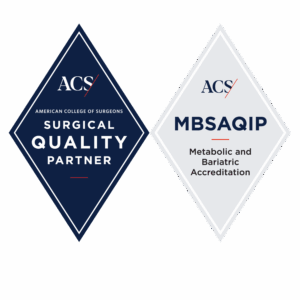Bariatric Surgery in Topeka, KS
When diet, exercise, and medication aren’t working, weight loss surgery can help you achieve your weight loss goals and live a healthier life. At the University of Kansas Health System, we understand that bariatric surgery is a big decision. Our doctors are here to help answer any questions you may have about weight loss surgery, including whether it may be right for you. We offer pre-surgery counseling, post-surgery support, and a wide range of resources to help you live a healthier, more active life.

Weight Loss Procedures We Offer
Research has shown that weight loss surgery is an effective way to achieve long-term weight loss. It can also improve conditions like diabetes, heart disease, and sleep apnea. Our medical weight loss program provides bariatric surgical treatments to treat a wide range of conditions that affect your ability to maintain a healthy weight.
We Offer the Following Types of Weight Loss Surgery:
- Biliopancreatic diversion with duodenal switch (BPD/DS)
- Revisional surgeries
- Roux-en-Y (gastric bypass)
- Sleeve gastrectomy
Bariatric surgery may be an option for adults with a BMI of 40 or more, or for patients with serious health conditions like diabetes or heart disease who have a BMI between 35 and 40. Patients with a BMI below 35 do not qualify for bariatric surgery.
After Weight Loss Surgery
Weight loss surgery is just the first step towards a healthier life. To help you achieve the best results possible, our weight loss program also provides:
- Exercise education and wellness classes
- Nutrition education and guidance
- Regular follow-up appointments
- Support groups
Research has shown that patients who attend support groups are more successful in reaching their weight loss goals after surgery. For this reason, we offer free online weight loss support groups to our patients who have had weight loss surgery or are about to have weight loss surgery. The virtual group provides education and encouragement through guided discussions and guest speakers— all from the comfort of your home. Family and support persons are welcome to attend as well.
Weight Loss Surgery – Get Started
The decision to have bariatric surgery is best made with the right information and an equal amount of support — and we’re here to provide both. Our process is designed to make getting started as smooth and supportive as possible.
Here’s how it works:
- Watch Our Online Seminar
Begin by viewing our educational seminar, where you’ll learn about our process, available surgical options, and what to expect. - Complete a Quick Quiz
After the seminar, complete the short quiz following the video and earn a score of 100 to confirm your understanding. - Connect with Our Team
Once you’ve completed the quiz, enter your contact information, and a member of our team will reach out to review your insurance coverage and schedule your one-on-one consultation.
At your consultation, we’ll work together to create a personalized treatment plan tailored to your needs. From surgery to the lifestyle changes that follow, our caring team will guide you every step of the way.
You’ll also have access to a wide range of post-surgery resources, including:
- Support groups
- Nutritional advice
- Weight loss seminars
- Exercise classes
With the help of our dedicated specialists, you’ll be on your way to the healthier life you deserve.
Why the University of Kansas Health System?
We are proud to have the most experienced weight loss surgery team in the region, with more than 3,000 bariatric surgeries performed since opening in 2002. In addition to having top surgeons, we provide a multidisciplinary team including a medical weight loss expert, dietitians, nurses and other professionals with expertise in caring for patients before, during and after weight loss surgery.
Since 2007, our bariatrics program has been named an Accredited MBSAQIP (Metabolic and Bariatric Surgery Accredited Quality Improvement Program) by the American Society for Metabolic and Bariatric Surgery (ASMBS) and the American College of Surgeons (ACS). The MBSAQIP Accreditation recognizes surgical programs with a demonstrated track record of favorable outcomes and low complication rates.
The University of Kansas Health System St. Francis Campus is also recognized as a CIGNA Bariatric Center of Excellence.
We look forward to working with you and helping you reach your weight-loss goals.
Recognitions and Accreditations
MBSAQIP Accredited – Comprehensive Center since 2007

Our Patients Share Their Non-Scale Victories!
“I can fit in the go-carts!”
“I am free from my Diet Pepsi addiction.”
“I have less pain in knees and back, my fibromyalgia seems to have lessened greatly.”
“I’m wearing clothes that I have not been able to wear for years.”
“I’m walking more without pain.”
“I can walk further and exercise more and longer.”
“I’m roller skating again! (I used to LOVE to roller skate.) I’m even joining the local roller derby team!”
“I’m able to ride the rides at the county fair again! (Before I couldn’t fit in the seats with the safety belts.)”
“I have overcome my embarrassment of going to the gym.”
“I can keep up with my daughter better.”
“I can cross my legs.”
“Lots of people compliment me on appearance, some don’t know me. I feel good!”
“I have no more knee pain.”
“I can swing at the park with my grandkids.”
“For the first time ever I can play, ride a bike and go walk with my kids. It means more to me than you will ever know.”
“I no longer have to use a CPAP machine.”
“Easier to run around (really RUN) with my two year old.”
“I took a roller coaster ride for the first time in 19 years.”
“I have much more energy and I’m not taking all the diabetic medications anymore.”
“A friend I hadn’t seen in months nearly didn’t recognize me.”
“I fit into pants I haven’t been able to wear in 8 years.”
